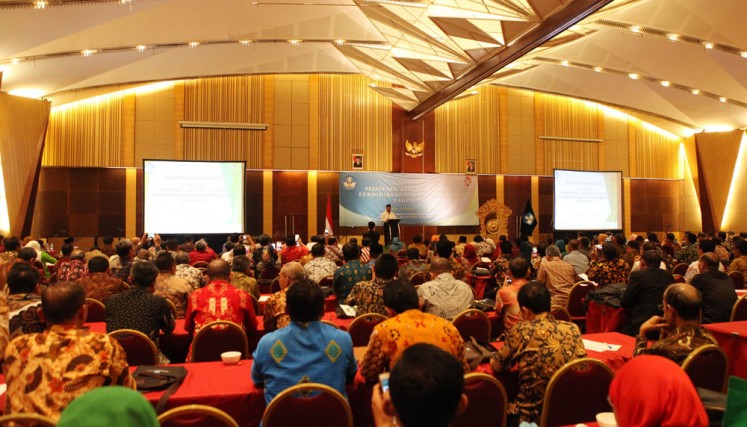School enrollment zoning system seeks to boost national education’s overall quality
To refine its school enrollment zoning system policy, the Education and Culture Ministry recently issued Ministerial Decree No. 14/2018 on the policy's implementation, seeking to boost the overall quality of the country's education through nondiscriminative and transparent school enrollment methods for elementary and junior high school students.
Change Size
 Policy talk: Education and Culture Minister Muhadjir Effendy (right) strikes a gong to officially open a gathering of representatives of education agencies across the country from May 30 to June 1 in which the implementation of the ministry’s latest decree No. 14/2018 on school enrolment zoning system was discussed. (JP/Arief Suhardiman)
Policy talk: Education and Culture Minister Muhadjir Effendy (right) strikes a gong to officially open a gathering of representatives of education agencies across the country from May 30 to June 1 in which the implementation of the ministry’s latest decree No. 14/2018 on school enrolment zoning system was discussed. (JP/Arief Suhardiman)
The Jakarta Post/Jakarta
To refine its school enrollment zoning system policy, the Education and Culture Ministry recently issued Ministerial Decree No. 14/2018 on the policy's implementation, seeking to boost the overall quality of the country's education through nondiscriminative and transparent school enrollment methods for elementary and junior high school students.
The policy classifies schools in each regency and city into separate zones and mandates that schools enroll students living in their vicinity to make sure that no student has to travel far to attend lessons.
The policy will be applied across elementary, junior high and senior high schools, while vocational schools are exempt from the policy.
“Through the new ministerial decree, the ministry has simplified the old regulation by revising a number of terms detailing the implementation of the school enrollment zoning system, starting from its requirements, selection, school zone classification and distribution of students,” Education and Culture Minister Muhadjir Effendy said on May 30.
According to Elementary and Secondary Education Director General Hamid Muhammad, the new ministerial decree was formulated based on feedback from education agencies across the country concerning obstacles they faced in implementing the new system in the field.
From May 30 to June 1, the ministry held a gathering to give a presentation on the policy to representatives of education agencies from 22 provinces. During the gathering, the ministry also received feedback on obstacles faced in implementing the new system, which had been continuously refined since it was first launched in 2016.

He further explained that the new decree would guide education agencies in determining all school zones throughout Indonesia along with each school’s capacity to accommodate students by the end of June this year at the latest. Students are sure to be accepted by schools in their zones, with age and school certificates being the only two enrollment requirements, said Muhadjir.
In order to be enrolled in an elementary school, a student must be 6 to 7 years old by July 1, when the new academic year starts. To enroll in junior high school, meanwhile, a student must be a maximum of 15 years old and possess an elementary school graduation certificate. To enroll in senior high school, a student must be a maximum of 21 years old and possess a junior high school graduation certificate.
Muhadjir said the school enrollment zoning system – which has been implemented in developed countries around the world – sought to improve the national education’s overall quality by ensuring proportional student distribution and putting an end to parents’ tendency to favor particular schools.
“When we use a school’s reputation as being popular or not as the main consideration to enroll children, it results in uneven distribution of education quality because it might discourage the less popular schools from improving their quality. This tendency might also prompt popular schools to charge parents more money to reserve a spot for their children by jual bangku [selling seats],” he explained.
He added that the zoning system policy also ensured that students were accepted in schools located in their areas, so they could reserve the energy that would otherwise be drained by traveling to reach their highest learning potential.
“By walking to school, children can also learn social skills, such as greeting people on the road,” he explained.









